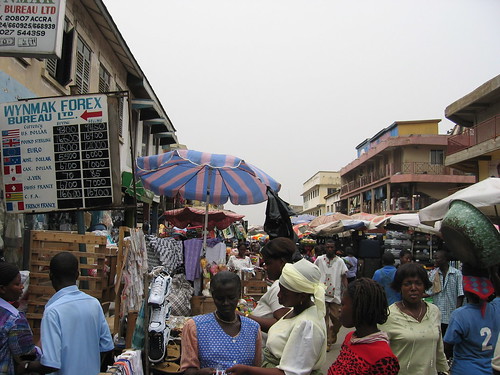Monday, January 02, 2006
Africa Calling
Africa Calling - SND MNY 2 YR MBL |
Ethan Zuckerman
Leapfrog Nations - Emerging Technology in the New Developing World
 |
There's a lot less "small boy" work in Accra with the rise of the cellphone on the African continent. According to the New York Times, the number of cellphones in Africa has increased from 7.5 million to 76.8 million, putting phones in the hands of roughly one in ten Africans.
(Or sometimes two or three - some of my Ghanaian friends carry multiple phones, each of which works on a different mobile network. When one network is down, there's a good chance another phone will work. And, like in North America, it's cheaper to make calls within a network than across networks.)
The explosive growth of the mobile phone market in Africa surprised many observers, who assumed that impoverished countries would be a poor market for a "luxury" item. They failed to understand three factors that have been critical to the rapid spread of mobile phones: new versus replacement infrastructure, pay-as-you-go pricing, and used phones.
- Mobile phones in the US and Europe were a luxury item when they were introduced. They enabled an expansion of an existing behavior - people could already make phone calls, but now they could make them in the car... or in restaurants, annoying other patrons. In most of Africa, landline infrastructure was so poor that very few people could make a phone call at all - waiting lists for new phone lines could be years long and installation costs could be hugely expensive.
Rather than replacing existing, functional infrastructure, mobile telephony in Africa created new infrastructure. And because a whole new type of behavior was possible, the adoption curve was far steeper than in markets where mobile phones replaced a network that already worked pretty well.
- Most North American mobile phone users receive a bill for their usage every month. While this model seems obvious, it relies on critical pieces of infrastructure missing from many African economies: street addresses, a functional postal system, systems to check consumer credit; widespread use of checks to pay bills. Mobile network operators started to experience success in Africa when they gave up on monthly service plans and started selling scratch-off phone cards that allowed users to pay modest fees and "fill up" their phones on a pay as you go basis. By making these cards available in small denominations, users buy as little as $2 worth of airtime at a time.
- Importing shipping containers filled with used mobile phones has become a profitable business for entrepreneurs on and off the continent. GSM phones are often available for less than $30. Phones that work on other standards, like the antiquated AMPS analog standard, are sometimes available for even less, and businesses like Kasapa in Ghana have targetted the lower-end mobile phone market, offering cheaper phones and airtime than technically superior GSM-based companies.
More fundamental than these three factors is the fact that very poor people are willing to pay money to communicate. This was considered a controversial premise when Iqbal Qadir founded Grameen Phone, Bangladesh's first mobile phone company. Selling phones to poor women and encouraging them to sell airtime to farmers, fishermen and other members of the rural poor, Qadir and company proved that there's money to be made serving the communications needs of the poor - Grameen Phone is now the largest phone company in Bangladesh and a huge contributor to the national economy.
The spread of mobile phones in Africa has opened the possibility that a phone could be more than a communications device. MTN, a South African company that is becoming a telephony powerhouse on the continent, has announced a partnership with Standard Bank to introduce MTN Banking, a service that will let customers make simple banking transactions via SMS and, eventually, transfer funds and make payments using their mobile phones.
These services solve critical problems in a part of the world where checking and credit cards are not widespread and the vast majority of transactions involve cash.
(Imagine for a moment buying an automobile and paying cash. Now imagine that the largest bill available in the country is a $2 bill. A decade ago, I found myself serving as "bag man", carrying shopping bags of money across Accra to help a friend purchase a car. It warms my heart to think of carrying out the same transaction using a mobile phone.)
Not only is cash easy to lose or steal, but it's difficult to transport. Funds transfers via SMS make it possible to send money to Mom in Kumasi without getting on a bus, saving time for her daughter in Accra.
It's hard to predict whether MTN Banking will thrive, but it's hard to dismiss the possibility of success given the incredible growth of mobile phone technology on the continent thus far.